An Invigorating Summer
More than 300 Swarthmore students tackle research projects and internships across the disciplines and the world.
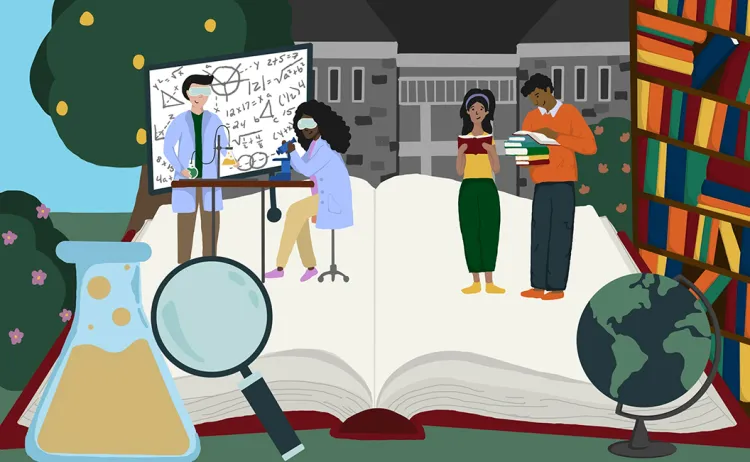
It was another summer of discovery for Swarthmore students, with more than 300 undertaking either research projects or internships. The students - whose locations ranged from virtual, on campus, and across the world - worked with Swarthmore faculty, alumni, experts from outside institutions, or independently. In every case, the projects brimmed with hands-on learning.
Below, an array of students across the disciplines share highlights of their summer opportunities.
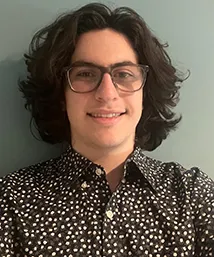
Ben Aaron ’26, an engineering and applied mathematics major from Tenafly, N.J.
Focus: Sustainability of horizontal civil networks in rural areas, through the University of Nebraska-Lincoln Summer Research Program, with support from the National Science Foundation.
“My research focused on electric vehicle charging stations and how they relate to job density and urbanism/rurality using spatial data. Ideally, this research can contribute to decisions for where to place/allocate funding for charging stations to make them as useful and equitable as possible. I've been really enjoying it! I'm learning a lot about geographic information systems and spatial data, and getting an experience with transportation engineering that I don't think I would've gotten elsewhere. The people are also really nice, and I'm networking with a lot of students from other schools.”
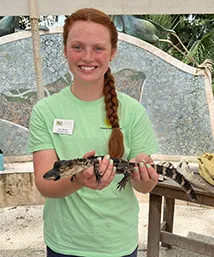
Lane Barron ’26
, of Bangor, Maine
Focus: Biology of the South Carolina Lowcountry as an educational intern at the Coastal Discovery Museum in Hilton Head Island, S.C.
"I teach people about the animals’ life cycles, their characteristics, and ways that we can safely coexist. These conversations are important to make sure that people learn about how their actions can hurt or help the populations of different animals.
This experience has helped me learn so much about the Lowcountry, and it has helped solidify my interest in working in science. I’m excited to continue to learn more at Swarthmore, and I hope to be able to combine the fields of biology, environmental studies, and psychology to learn about the environment, how to protect it, and how to effectively teach others."
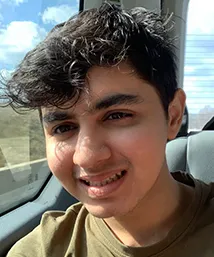
Sumama Chhotani ’26, of Karachi, Pakistan.
Focus: Documentation in Pakistan of Chhotani’s mother tongue, Memoni, an endangered dialect, through a fellowship from the Lang Center for Civic & Social Responsibility.
“This experience in field linguistics made me realize the significance a language holds in connecting people, establishing their identities and desire to pass it on to future generations. When I interviewed a few speakers in my community in Pakistan, I realized one of the biggest problems is still being in a colonized mindset where individuals think that a foreign colonizer language and culture (English, in our case) is superior to their own language and culture. This is a huge issue in the Indo-Pak subcontinent, and to solve this requires a change in mindset. This has led to lower and lower adoption of native tongues and thus decline in the number of speakers.”
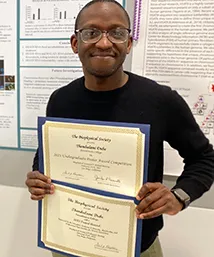
Thembalami Dube ’24, a biophysics major from Harare, Zimbabwe.
Focus: In vivo probing of HSATII RNA biomolecular condensates, in the MIT lab of geneticist Richard A. Young.
“This experience gave me a firsthand account of what a career as a physician-scientist would look like. Collaboration with skilled scientists and exposure to biochemistry and biophysics assays inspired a new approach to studying heterochromatic condensates: a topic I have been pioneering in Associate Professor of Biology Dawn Carone’s lab at Swarthmore. At MIT, Professor Young is a transcriptional and heterochromatin condensate pioneer himself. I am grateful for the opportunity to interact and learn from the specialists in the field. While I cannot learn everything there is to know about biomolecular condensates in three months, I’m gaining important insights relevant for my honors thesis at Swarthmore.
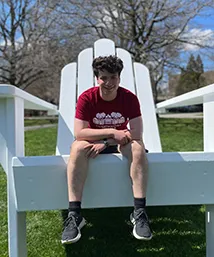
Charlie Grabois ’26, of Madison, Wisc.
Focus: Using behavioral economics to analyze health care decision-making, at the NYU Grossman School of Medicine, through the Starfield Student Research Grant of the Social Sciences Division.
“I’m working with Professor Rajesh Vedanthan ’95 and an NYU undergraduate research assistant on a scoping review covering the intersection of behavioral economics, health care, and trust. I've really gained an appreciation for the precision and discipline required to produce good academic research. It takes a lot of work and creativity to just craft protocols for your research, even before actually starting to do the research. My research this summer has also taught me to collaborate much more effectively. It's surprisingly hard to know when to ask for help, when to delegate a task to someone else, or when to just fake it until you make it.”
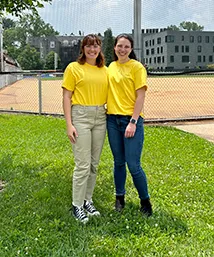
, an English literature major from Columbus, N.J.
Focus: Chester County Mobile Home Tax Reassessment Project as intern at the Legal Aid of Southeastern Pennsylvania located in West Chester, Pa.
"Because Pennsylvania does not reassess property taxes for residents as these homes age, many mobile homeowners are overtaxed hundreds of dollars every year. Under the guidance of Sara Planthaber ’17, I worked directly with over 50 clients and collected the home information to be used in their appeal hearings this fall. I’m proud to be a part of this incredibly impactful project that has reached so many in the Chester County community. Interning at Legal Aid this summer has been an invaluable resource for my educational and professional advancement."
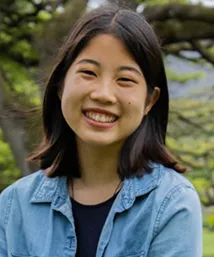
Chloe Kanemaru ’26, of Honolulu, Hawaii.
Focus: Ancient Greek Language course at UC Berkeley, through the Susan P. Cobbs Fellowship from the Classics Department as well as support from the Arts and Humanities Division.
“Even though the class was intensive, and constant testing (under very short time constraints) proved challenging at times, just being able to translate an entire passage of Attic Greek into idiomatic English was a rewarding thrill I can never forget. Once we had learned the bulk of Greek grammar and vocabulary, we were presented with the option to read/translate one prose and one poetry piece in an intimate instructor-led session. I chose to read Lysias 1, "On the Murder of Eratosthenes" and Euripides's Medea. I leave this class deeply inspired to continue to pursue my journey and studies through the wonder that is the ancient world."
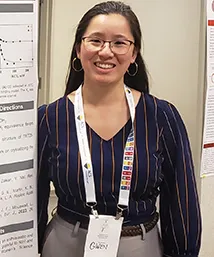
Gwendolyn Lam ’24, a mathematics and biochemistry major from Mendham, N.J.
Focus: Characterizing the biophysical and structural aspects of DNA-ligand interaction with Professor of Chemistry Liliya Yatsunyk, through the Frances Velay Women's Science Research Fellowship.
“I enjoy summer research because it is invigorating to explore the nuanced facets of the project and learn how to be a researcher alongside like-minded peers in a supportive environment. After several months of work, I proudly presented talks to other chemistry labs from Haverford, Ursinus, and the National Institutes of Health (NIH); presented a poster at the American Chemical Society (ACS) regional conference in New York; and solved a crystal structure from crystals I grew that is now published in the Protein Data Bank (PDB). My principal investigator also organized a visit to the NIH, brought alumni to the lab to talk about their post-graduation journeys, and connected me with people who have gone through graduate programs that I am now excited about.”
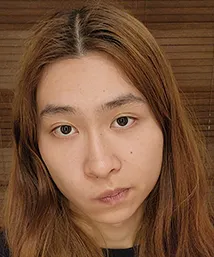
Ark Lu ’24, a linguistics major from Sherman Oaks, Calif.
Focus: Tracing the development of changes within the complex Thai pronoun system, with Visiting Assistant Professor of Linguistics Rikker Dockum, through summer funding from the Social Sciences Division.
“I learned about how the socio-political environment complexified the language, and I came across sources that would be useful for my senior thesis. It's very interesting how different the pronoun systems of languages related to Thai are. I expected languages that are more closely related to each other to work more similarly. [Dockum and I] presented preliminary findings at a conference in April, and I was happy to keep working on the project this summer.”
The duo is preparing to present at the International Conference in Historical Linguistics in Heidelberg, Germany in September, and has another abstract under review for the Linguistic Society of America Conference next year.
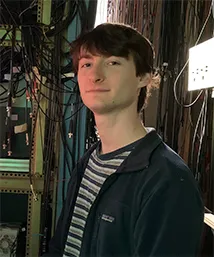
Solomon Murdock ’24, an Honors physics major from Chevy Chase, Md.
Focus: Experimental study of plasma merging with Morris L. Clothier Professor of Physics Mike Brown at the Swarthmore Spheromak Experiment, through the Swarthmore College Honors Fellowship.
“The most exciting moment of the summer was when I finished writing code that analyzes data collected by magnetic field probes and visualizes the magnetic field produced by the plasma we are studying. While it was already known that the magnetic field was shaped like a swirl, it was inspiring to see the swirling magnetic field in data that I had collected. I’m not sure what else the lab will discover this summer, but I’m excited to see what we find."
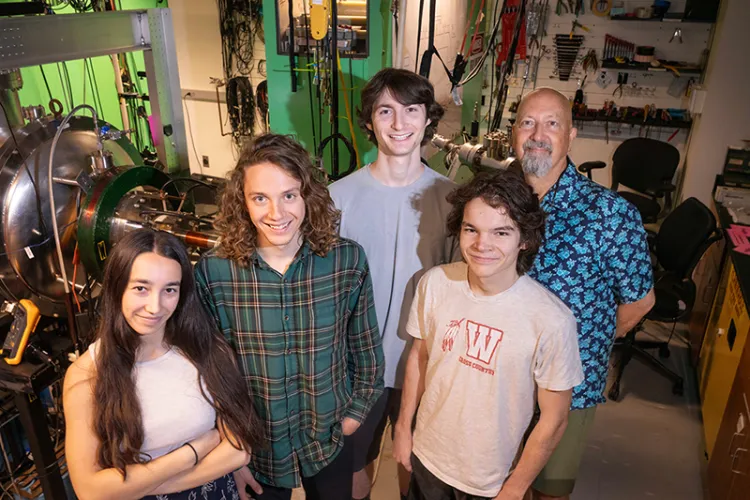
Collaborating with Murdock in the Swarthmore Spheromak Experiment were (from left) Ayla Cimen ’25, Kya Butterfield ’25, Alex Sheldon ‘24, and Morris L. Clothier Professor of Physics Mike Brown.
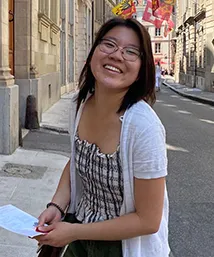
, an Honors music and French & Francophone studies major from Swarthmore, Pa.
Focus: Camille Saint-Saens’s opera Samson et Dalila (1877), in the south of France, with support from the Mellon Mays Undergraduate Fellowship Program.
“I am analyzing the opera itself and its sociopolitical context to understand how it relates to 19th-century French nationalism and imperialism. I conducted archival research at the Library of Geneva, where I studied several of Saint-Saëns’s letters. By reading Saint-Saëns’s exchanges with his contemporaries, I experienced both the difficulty of deciphering his handwriting and the joy of learning more about his personality! Participating in an immersion program in France has helped me with my project, as French is one of my main research languages. My summer work will contribute to my music major senior thesis on French musical exoticism and prepare me to pursue a Ph.D. in historical musicology.”
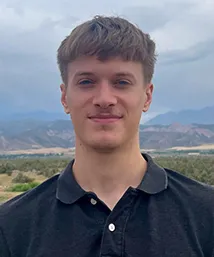
Liam Rodgers ’24, a Russian and chemical physics major from Wynnewood, Pa.
Focus: Biochemistry lab techniques in science research at the Perelman School of Medicine, through the David Baltimore/Broad Foundation Summer Research Fellowship.
“This experience was an absolutely invaluable opportunity to learn many biochemistry lab techniques and dive into the world of science research. During my time, I had the chance to work on several exciting projects and shadow the clinical work of the physician-scientist who was hosting me. As a future applicant to M.D.-Ph.D. programs, the flexibility Swarthmore provided to support off-campus research in a medical university allowed me to pursue my interests.”
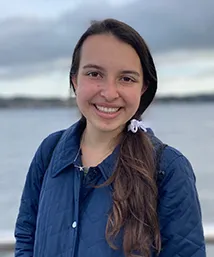
Kyra Roepke ’24, a linguistics and biochemistry major from Hillsborough, Calif.
Focus: The structure and dynamics of a particular protein in the influenza virus, through the Mayer Davidson ’57 Summer Research Fellowship.
“It's a rewarding and frustrating process — sometimes the cells just don't do what I want them to do! — but it's made more fun by the fact that everyone on the chem hallway is so willing to help each other. My favorite moment came right after a moment of desperation. I had plated my bacterial cells, waited 12 hours, and absolutely nothing had grown. Out of hope (and sadness), I left the plates overnight thinking I would just get rid of them later, but then in the morning my bacterial colonies had grown to be the most perfect little polka dots! It was a nice reminder that science rarely goes to plan, but also is rarely a complete failure — and it was also nice to celebrate in the lab with people who knew and understood the struggle of wrangling bacteria themselves.”
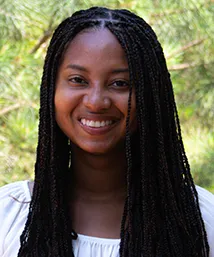
Destiny Rosulme ’24, a human rights and French & Francophone studies major from Laud Lakes, Fla.
Focus: U.S migration policies and their effects on Haitian migrant communities, with support from the Peace & Conflict Studies Department.
“I’m working on independent research for my human rights thesis where I will be analyzing U.S. migration policies and their disproportionate effects on Haitian migrants since the 1980s. I have learned how challenging it can be to start a project of this nature. It has involved a comprehensive literature review and countless meetings to fine-tune my research questions and theoretical framework. I'm really grateful for the support that I have received from various Swarthmore faculty and staff in this process. As an aspiring human rights lawyer, I look forward to building upon my thesis research in ways that are meaningful for migrant communities.”
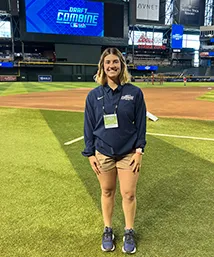
, an economics and psychology major from Atlanta, Ga.
Focus: Prospect Development Pipeline as a baseball operations intern for USA Baseball.
"Through my work with USA Baseball, I have administered tests using RightEye technology, which is a visual perception test. This summer, I have become increasingly fascinated by perception and reaction, and its relationship with performance. I have a passion for mental performance and sport psychology, and working this summer has increased my interest in research.
These experiences have increased my interest in my studies at Swarthmore as well. As an economics and psychology double major, I have seen how the baseball world works from multiple perspectives, and I am excited to keep learning more about both the business aspect of running an MLB club and mental performance in sport."
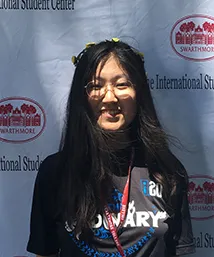
Ariel Zhao ’24, an Honors economics and physics major from Maanshan, China.
Focus: Data analysis in Zambia, through an Economic Justice Internship of the Social Sciences Division..
“My project, with Associate Professor of Economics Syon Bhanot, studies if conversational two-way messaging helps improve financial management of text recipients. The data was collected from a field experiment recording all financial activities for over a year of more than 75,000 households in Zambia, and my task was to use statistical software to recode and reformat the data to make it ready for analysis.
This process was rewarding. It was inspiring for me to get involved in discussions with economists to learn about how they solve problems in research. The new computer cluster of Swarthmore, Strelka, also makes processing large datasets possible. The experience this summer has been a great preview and preparation for my future journey in economics.”
Visit the Swarthmore Libraries site for more student reflections on summer research.



